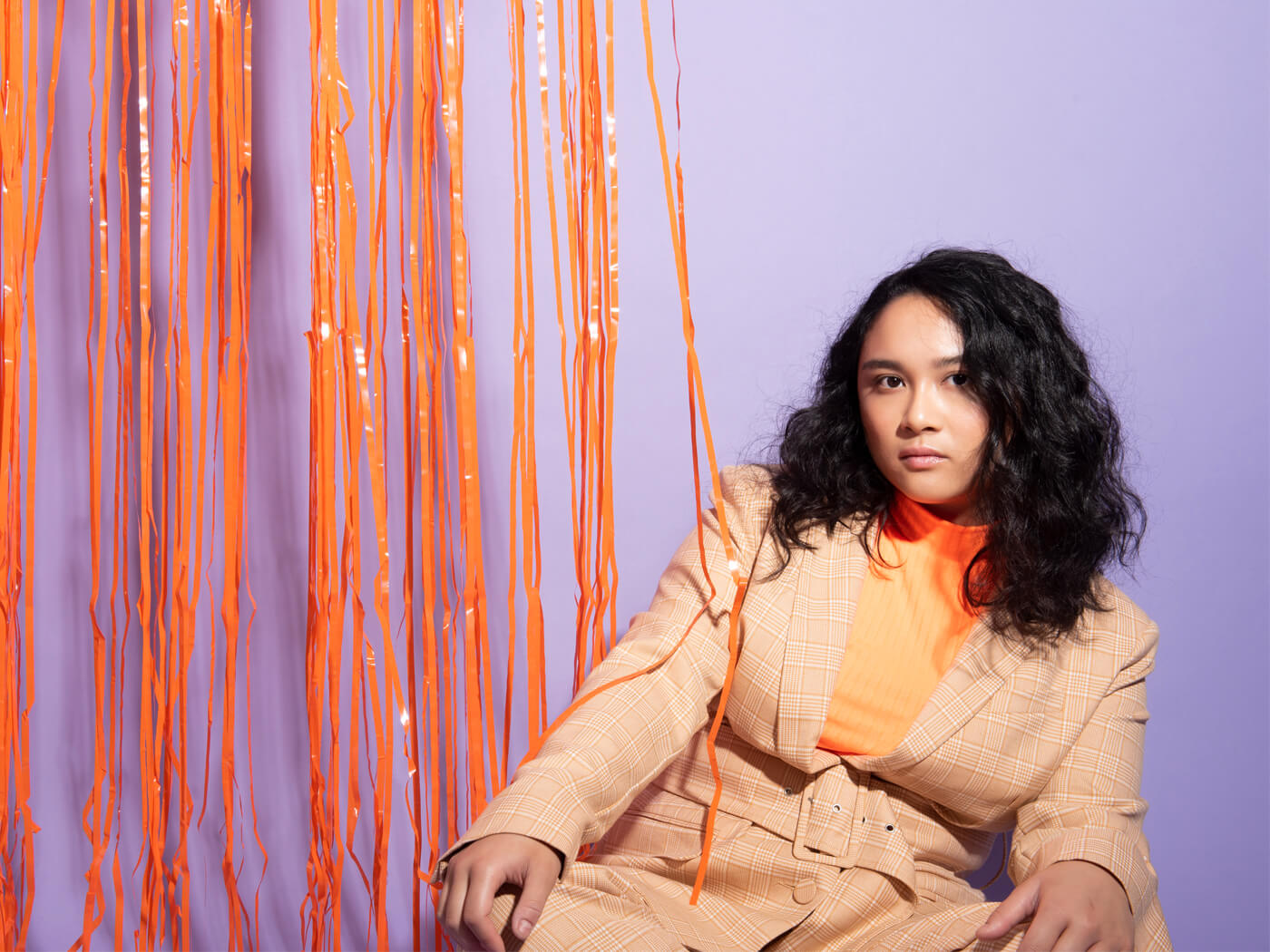Jay Som, indie-rock’s newest star, is taking her hushed dream-pop out of the bedroom
Melina Duterte talks the process behind the follow-up to 2017’s Everybody Works, her developing identity as a guitarist and finding community in her new home of Los Angeles.

Image: Kris Kirk
Melina Duterte’s first song, written on a nylon-string Yamaha guitar she got for her 12th birthday, was about her love and disdain for Taco Bell.
More than a decade on, Duterte’s written many more songs, although they’re not all about Mexican-inspired fast food. As Jay Som, she’s gifted the world intimate, introspective music that ranges from lo-fi to bedroom-pop to indie-rock. But some things haven’t changed: She’s still making songs in her own bedroom and constantly learning about the instrument that kickstarted her musical journey.
Next month, Duterte will release Anak Ko, her second studio album as Jay Som and the anticipated follow-up to 2017’s Everybody Works. She produced, engineered and mixed the record herself, but also welcomed collaborators into the fold for the first time. Anak Ko – which means “my child” in Filipino – features contributions from Vagabon, Justus Proffit, Chastity Belt’s Annie Truscott, Boy Scout’s Taylor Vick and more.
Before the record’s release on 23 August, Duterte sat down with Guitar.com to talk about new beginnings, finding community and growing as a guitarist.
So, you recently moved from the Bay Area to Los Angeles. Did that move impact you creatively?
It’s been great. I’ve lived in the Bay Area my whole life and it just felt natural to make a change and be in a different environment. It just made sense for me to just be in a different city. Knowing that LA is the hub of the entertainment industry and music industry, it does feel good to be around so many people that have the same job. There’s a work ethic and a motivation that I really relate to, so it feels good that way. But at the same time, I miss the tight-knit music community from the Bay that’s not here, because it’s so big here.
Did you find a new community to get involved with?
Yeah, I think when I moved here, throughout the year I was working with a lot of people. In terms of producing, I was open to having people over to do writing sessions and I was going over to studios and people’s homes to write and just collaborate. I think that opened up a lot of the new territory for songwriting and music production that I really got to apply to this new record. It also made me feel more comfortable to add people onto the record, like my touring members and some other friends. It certainly changed things up.

For Everybody Works, you wrote, recorded, played and produced it entirely in your bedroom. And you kind of did the same for this one, right?
Yeah, I actually did most of it in my bedroom but I think I recorded it in different places. I went to my drummer’s parents’ house and we recorded all the drums there. I also recorded stuff when I went to Joshua Tree for a couple days and also my bedroom in LA.
Do you think you’ll always make records that way?
Yeah. I think it’s convenient and it’s just comfortable for me to work by myself and learn that way because I’m always wanting to get a little better at music production and engineering, I’m always reading about it. I just think it’s so much fun, too, but I would say I’m not opposed to going to the studio in the future or working with a producer. I think I just love to have full creative control at this point.
So you got your first guitar when you were 12…
Yeah, this really crazy Yamaha nylon-string. But the first electric guitar is what my dad bought me, an Epiphone Les Paul.
Do you remember if there were any guitar players that you really looked up to at the time?
Do you remember that band The Donnas? I was super inspired by Allison [Robertson], the guitar player. I was just like, oh my god, she’s so sick! I think she had a Gibson guitar but yeah, it was definitely the whole package. I mean she was really obviously so good at it. She’s well-trained, she can solo and she has sick riffs. At that time, like in the early 00s, you don’t really have that exposure to women playing music or having guitars. There’s only a few that you can name off the top of your head at that time.
When do you think you developed your own identity as a guitarist?
I think it’s still developing. I feel like I’m not that great of a guitar player, as much as I want to be. I definitely used to practice a lot more earlier in middle school and high school when I was teaching myself. I can write songs in my comfort zone. I cater a lot to my songwriting and I can translate from what I hear in my brain to a guitar easily, but sometimes it’s harder to translate more complex things like rhythms and music theory and stuff. I just don’t know how to read notes or apply that onto guitar music but I can do that with a trumpet. It’s just… it’s just mostly fun for me.
Do you think not knowing the theory of it impacts your relationship with the guitar?
I think it can get a little frustrating, because I will see a lot of my peers that I really look up to and they motivate me to get better. I want to get good too, but it is an intimidating instrument sometimes, because you�’re just holding this thing and you’re playing it to a bunch of people and you have the risk of messing up. It takes a while to build your self-esteem with any instrument.

So what guitars did you use on Anak Ko?
For this album, I used a Fender Telecaster guitar. I’m not sure where it’s from, but other than that I also used a Fender Stratocaster and for bass, I used a Fender P-Bass. I also used the Hofner reissue and the Fender Jaguar, the American Professional one. I also used my Danelectro.
Is there one that you gravitate towards?
I think probably my acoustic guitars, especially when I’m writing. I just got this Córdoba nylon-string and that helped me a lot with the demos, because it’s such a bare instrument and it’s so beautiful and soft that it kind of gives you a different perspective on what a song could sound like.
Did you explore any new techniques on this record?
I wanted to stray away from the standard territory with tunings, and I think that kind of makes songs a little more open and bigger. I feel like I used less flashy guitar techniques, too. For If You Want It, I used only bass. Throughout the whole thing, I think I had like 10 bass tracks total. I was just using the higher register in the neck for the bass and it was mostly dry, I just went DI and I did a lot of post effects after. Mostly just layering to make them sound super big and stuff.
I was also strict about having pedals on and not messing with them later, so I would use my Strymon reverb pedal a bunch, the BlueSky. I used that reverb and recorded that, instead of doing post-reverb. Sometimes I’d use a light octave pedal for certain things, and also freaky pedals like Eventide PitchFactor for the floaty lead parts.
Would you say that you have a different relationship with the guitar now compared to when you finished Everybody Works?
I think I get more excited about playing it now, because I’m touring and now that I’ve had this record done and it’s about to be released, it’s pre-rehearsal time for tour in the fall. I’m getting really excited to experiment with it. With studio stuff, you can do anything that you want and then with live shows, you can also do anything you want too. You can change up the song completely or change the instrumentation in parts. I think that’s always been like the really special part about playing live in this band: we just love to play different kinds of things with our guitars.
What would you like people to take from this new album?
I’m always open to just letting anyone just take my music and have their own meaning. Anyone can develop their own feelings and meaning for your lyrics or certain things, and be inspired by your songs in a way or the album as a whole. I think I want people to listen to the record and pick up things they might like. If they don’t, that’s okay. I don’t have a serious message for this record and it’s not specifically for someone or certain people. I just want listeners to feel like they are welcome.
Anak Ko is out 23 August via Lucky Number. Jay Som will tour North America and UK/Europe in the fall. Find dates here.
